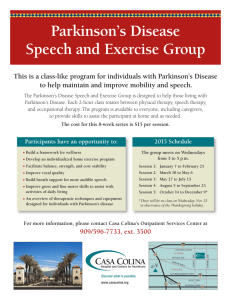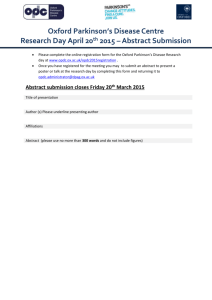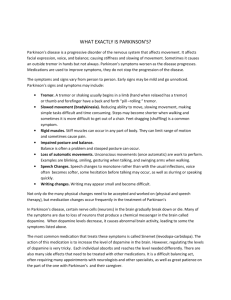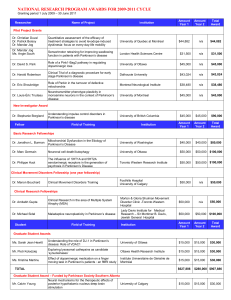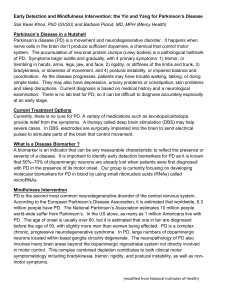File - Sheila Mulhern, RDN
advertisement
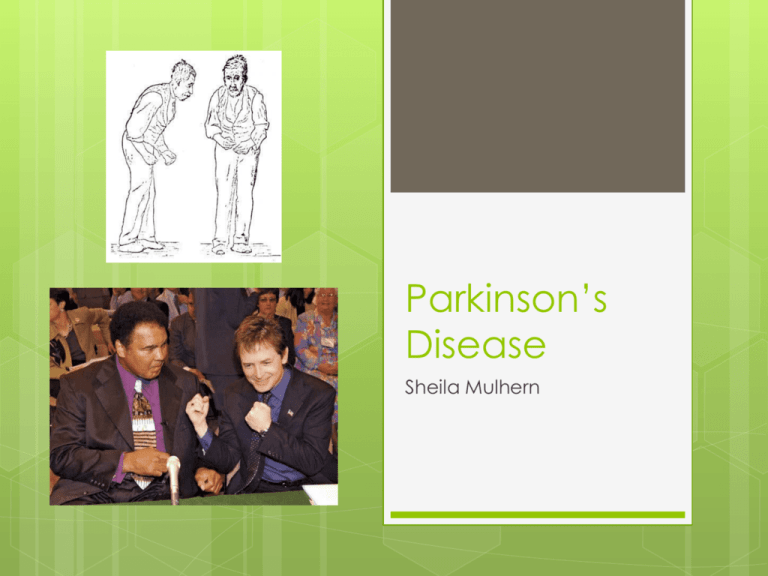
Parkinson’s Disease Sheila Mulhern Parkinson’s Disease Stats (PDF) One million Americans live with Parkinson's disease, - more than the combined number diagnosed with multiple sclerosis, muscular dystrophy and Lou Gehrig's disease. Approximately 60,000 Americans are diagnosed with PD each year, Worldwide: an estimated seven to 10 million people are living with Parkinson's disease. Men are 1.5 times more likely to have Parkinson's than women. Healthcare Costs & PD The combined direct and indirect cost of Parkinson’s, including treatment, social security payments and lost income from inability to work, is estimated to be nearly $25 billion per year in the United States alone. Medication costs for an individual person with PD average $2,500 a year, and therapeutic surgery can cost up to $100,000 per patient. Parkinson’s Disease A degenerative disorder of the central nervous system as a result from the death of dopamine-generating cells in the substantia nigra, a region of the midbrain Nerve cells can’t send signals properly causing loss of muscle function In response the adjacent thalamus and globus pallidus interna become overactive resulting in a tremor Most often develops after age 50 and one of the most common NS disorders of the elderly Named after English doctor James Parkinson, who published the first detailed description in An Essay on the Shaking Palsy in 1817 Etiology of PD Cause not officially known but genetic and environmental factors are linked Genetic: modern research shows six genes have been identified as causing familial PD alpha-synuclein, parkin, UCHL1, DJ1, PINK1, and LRRK2 Environmental: not direct but demonstrated to have the ability to cause nigrostriatal cell death appear to interact by interfering with mitochondrial function, inducing oxidative stress, and modifying proteasomal function. DJ1 and PINK1 are mitochondrial proteins and overexpression of alpha-synuclein and parkin induce mitochondrial defects Parkinson’s Disease Characteristics Tremor at rest Bradykinesia – slowness of movement Rigidity and stiffness Increased resistance to passive movement of limbs or trunk Micrographia – small, constricted handwriting Poor balance Diminished Dysphagia arm swing Hypomimia – lack of facial expression “Parkinson mask” Dysarthria – diminished voice volume, stuttering Depression Dementia PD & Nutritional Implications Medical Interactions: Levodopa PD & MNT Focus on drug-nutrient interactions Minimize dietary protein at breakfast/lunch Recommend antioxidants and antiinflammatory diet Study #1: The Mediterranean diet and Parkinson's disease Official Journal of the Movement Disorder Society – funding NIH & Parkinson's Disease Foundation (FEB 2012) 250 PD patients and 198 controls – diet questionnaire for past year Higher Mediterranean-type diet adherence was associated with reduced odds for PD after adjustment. Lower Mediterranean-type diet score was associated with earlier PD age at onset. PD patients adhere less than controls to a Mediterranean-type diet. Dietary behavior may be associated with age at onset. 2009 study on 1,410 French adults showed higher adherence to Med-diet was associated with slower MMSE cognitive decline (not other tests or assoc. with dementia Study #2 Study #3 Other study topics Caffeine may improve motor PD symptoms Flavonoids may aid PD risk Concussions as contributing factor to later developing PD Resources Case study: The association between Mediterranean diet adherence and Parkinson's disease http://onlinelibrary.wiley.com/doi/10.1002/mds.24918/abstract?syst emMessage=Wiley+Online+Library+will+be+disrupted+on+8+Dece mber+from+10%3A00-12%3A00+GMT+%2805%3A0007%3A00+EST%29+for+essential+maintenance&userIsAuthenticated =false&deniedAccessCustomisedMessage= Parkinson’s Disease Foundation http://www.pdf.org/en/parkinson_statistics Dopamine signaling in PD http://www.cellsignal.com/reference/pathway/parkinsons_disease. html https://www.michaeljfox.org/ Etiology of PD http://www.ncbi.nlm.nih.gov/pubmed/16717248 http://www.pdf.org/en/science_news/release/pr_1330379372
